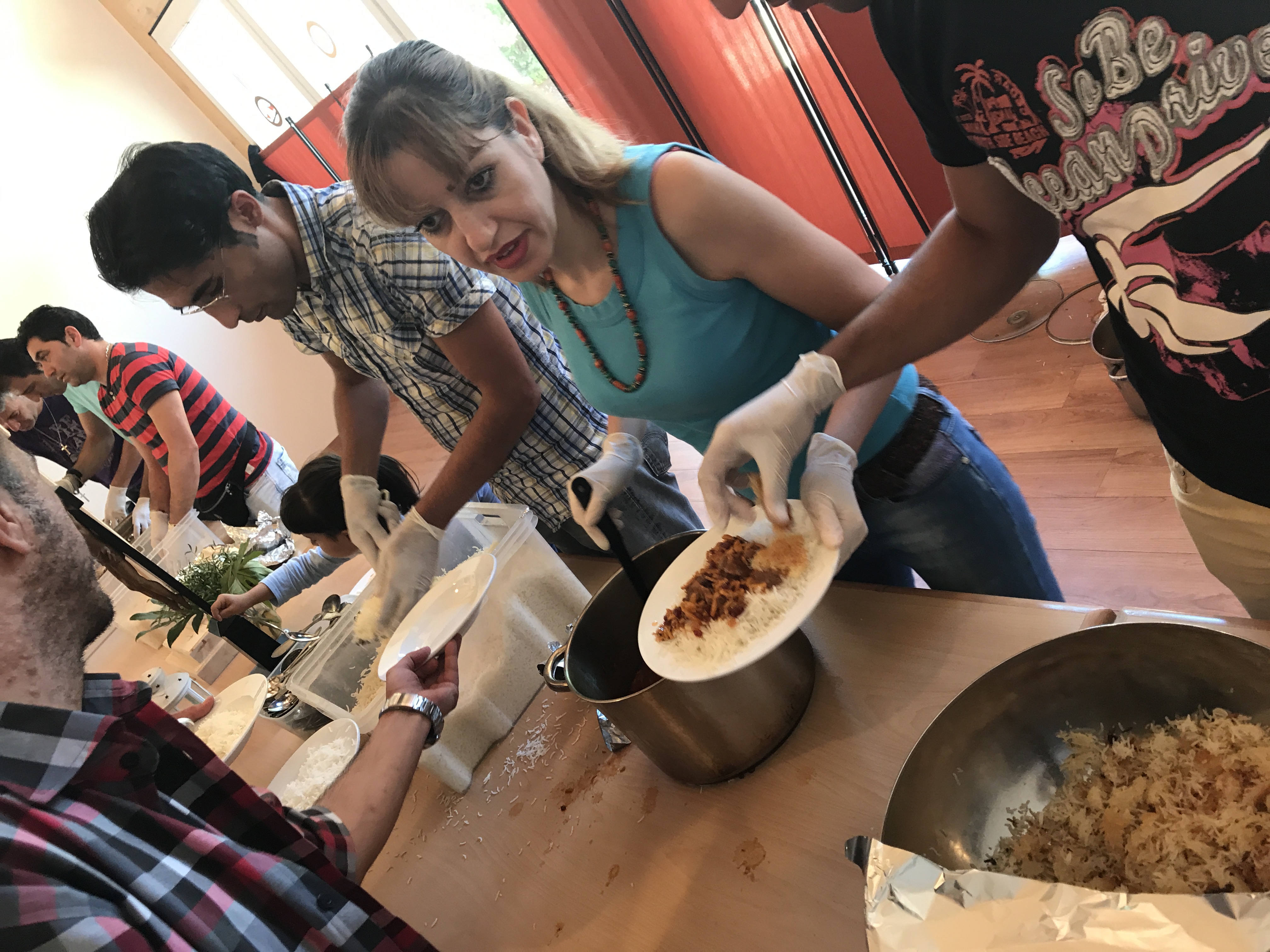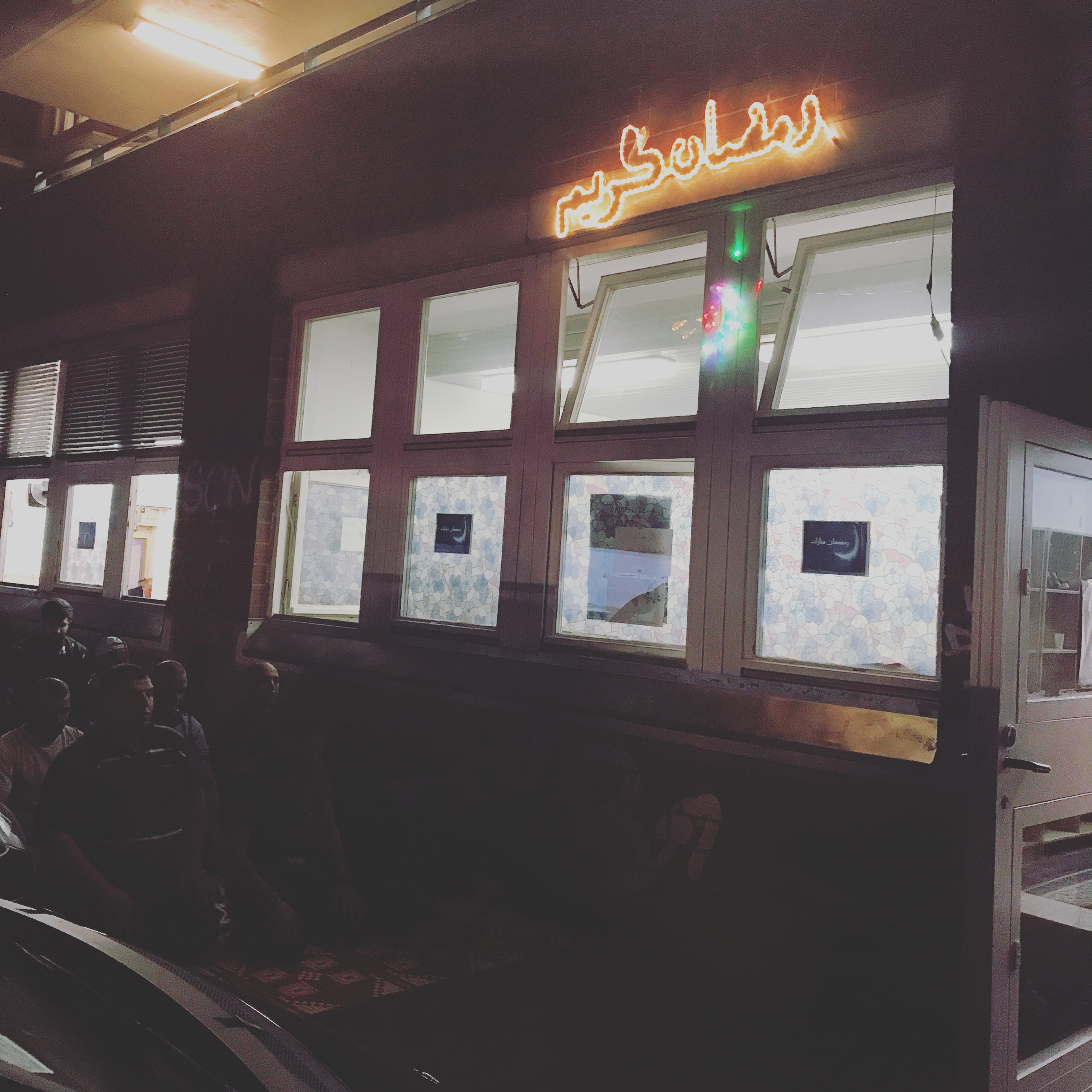
BERLIN — Two guitar players strummed and sang in Farsi as a stream of Afghans and Iranians knelt at the front of Trinity Lutheran Church, sipping wine from a shared Communion cup. Most of the congregants had arrived in Germany within the last two years, part of the refugee influx that's brought more than a million asylum seekers to the country since 2015.
At the peak of the crisis two years ago, this Lutheran church was holding mass baptisms of more than 200 people at a time, said the pastor, Gottfried Martens. "This church went from just a few hundred members to more than 1,300 Iranians and Afghans," Martens said. "All converts."
When Germany opened its doors to refugees in 2015, churches and church-affiliated organizations played a critical role in the response. Most of them took care to separate religion from humanitarian aid, especially those implementing state-funded relief projects. More than two years later, however, some churches are more actively defending refugees, even housing rejected asylum seekers in churches so German police cannot deport them, while submitting legal appeals for their cases. Many of these "church asylum" beneficiaries have also converted, a controversial act that's drawn criticism from Islamic groups and skepticism from German authorities.
Downstairs at the Lutheran church, 12 rejected asylum seekers were living in the basement. Iranian Ali Karimi, 44, said he'd been in the church building for almost six months. Karimi had fled to Germany after being imprisoned twice in Iran for political activism, he said, and had become a Christian while taking refuge in this building. "I'm looking for a religion that doesn't force, push or kill," Karimi said.
Refugees in the European Union are subject to a law called the Dublin Regulation, which requires that asylum seekers process their papers in the country where they entered the E.U. Karimi came in through Italy, so Germany could send him back there under the Dublin Regulation, as it tried to do with 29,507 asylum seekers in the first half of 2017. Yet, only 3,085 of those people were actually deported. One way to avoid deportation is through church asylum, in which people like Karimi live in churches for six months, after which German law allows asylum seekers to process their requests in Germany instead.
There are 351 church asylum locations in Germany, according to Asyl in der Kirche, a network of German parishes offering safe houses. They host 551 people, including 127 children and 301 Dublin cases. Legally, German police can deport both Dublin cases and rejected asylum seekers, a phenomenon that has increased for Afghans in particular. Germany started deporting hundreds of Afghans in 2016, sending them on charter flights back to Afghanistan, despite the country's growing instability. If refugees are living on church grounds, however, police won't enter.
Germany's church asylum movement dates to 1983, when a parish in Berlin protected three Palestinian families from deportation to Lebanon amid its civil war. Hundreds of refugees have sought German church asylum since then, with a success rate of more than 75 percent.
"The law doesn't say that police can't enter the church. But they don't do it. It's something sacred," said Martina Domke, head of migration at the Cologne office of Diakonie, the social welfare organization of Germany's Protestant churches. "The churches said: Sometimes from a humanitarian or a Christian point of view, the law is not correct," Domke said.
Conversion is both a side effect of church relief and a potential advantage for rejected asylum seekers, who can claim deeper need for asylum if they are at risk of religious persecution in their home country. What's tricky for both authorities and church leaders is determining whether a convert's faith is real. Many of Martens's church members have been rejected and told they are not really Christian, which Martens said is a cause of contention between authorities and the church.
"Pastors say, 'I know this man. He is a Christian,' and they say, 'He's just cheating,' " Martens said. One of his congregation members was asked what illness Martin Luther died of, he said, and when he couldn't answer, he was told he wasn't a Christian.
"We as churches don't want to support cheating via religion. That's why we check so carefully — if someone can't explain to me why he wants to be a Christian, I won't baptize him," Martens said.
Bekir Alboga, general secretary of the Turkish-Islamic Union for Religious Affairs, Germany's largest Islamic organization, said converting refugees is a form of abuse.
"You want to give bread in one hand and a Bible in the other," Alboga said, adding that the main reason Islamic groups don't do as much for refugees as Christian groups is because of their legal status. Germany's two main churches are highly structured and close to the state, with long-established status as public "corporations" that can own land, collect taxes and receive government money to implement social welfare projects. Germany's mosques and Islamic associations have not attained that status.
"Almost all support and work for refugees are paid from the government to church organizations," Alboga said.
Church leaders say government money is exactly why conversion is not a goal of the mainstream German church. "We're paid by the government, so our work must be open to everyone. We have to follow humanitarian principles and Christian principles," Domke said, adding that those latter principles influence Diakonie's worldview but don't compel it to recruit others into its religion.
"The Protestant church says: Jesus was a refugee, so love the other person. But we're not trying to make them part of a group."
Martens disagreed with the main churches' aversion to conversion, but also rejected Alboga's accusation of active missions work. "We are not doing mission work among Muslims," Martens said. "But people who come here are fed up with Iran and Afghanistan, and looking for an alternative. I don't think we should patronize them and say, 'You should know there is a better Islam than this.' This is religious freedom."
Though some of the converts may be pretending for the sake of bettering their chances at asylum, others point out that changing religion has made their lives harder.
"I can't believe when people ask, 'Didn't you just come here for a better life?' " said 32-year-old Saeed Hassan, who was jailed twice in Iran, for political dissent and for getting caught with alcohol and his girlfriend. Resentment toward religious government made him first an atheist and then a Christian.
He fled Tehran in 2015 when Iranian police caught him with a Bible in his car, eventually arriving in Berlin, where he has yet to receive refugee status. His parents have since divorced, he said, fighting over whether their son should risk return to Iran instead of struggling to survive in Europe. He hasn't seen his wife in two years, and he's been drinking more and more recently to fight off loneliness.
"I had everything in Iran," Hassan said. "My wife, my car, my house in the north — you think I want this 'better life' in camps and hiding, alone for two years now? I choose to believe in Jesus. But for everything else — to run, to be a refugee, to come to Germany — I did not have a choice."







